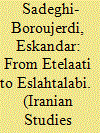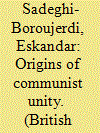| Srl | Item |
| 1 |
ID:
134822


|
|
|
|
|
| Summary/Abstract |
This article examines the importance of the political thought and praxis of politico, ‘reformist’ strategist and intellectual, Saʿid Hajjarian, and his rethinking of the post-revolutionary Iranian state’s sources and bases of legitimacy in the 1990s and 2000s. It also provides an exposition and assessment of a number of his recommendations for the realisation of ‘political development’ (towseʿeh-ye siyāsi) in the post-revolutionary order and their contribution to the discourse of eslāhāt during the presidency of Hojjat al-Islam Mohammad Khatami (1997–2005). Moreover, it attempts to situate Hajjarian within a broader spectrum of reformist political opinion and its proponents within the Islamic Republic of Iran’s political class.
|
|
|
|
|
|
|
|
|
|
|
|
|
|
|
|
| 2 |
ID:
161482


|
|
|
|
|
| Summary/Abstract |
This article analyses the historical emergence of the Organization of Communist Unity, which coalesced out of the National Front of Iran and its Organizations abroad. In the aftermath of the MI6/CIA-orchestrated 1953 coup d’état, a new generation of political activists left Iran for Europe and the United States to pursue their higher education. While politically active in the Organizations of the National Front Abroad, they gradually turned to revolutionary Marxism against the backdrop of the torrential waves of decolonization and resistance to imperial military interventions undulating across the Global South. This same constellation of activists was not only fiercely anti-imperialist, but also opposed any form of dependence on the U.S.S.R. or the People’s Republic of China. They would move from Europe and the United States to establish themselves in several locations across the Arab world, and pursue political activism and their advocacy of guerrilla warfare, as part of their ambition to launch a national liberation struggle against the Pahlavi regime. By examining Communist Unity’s predecessors and their manifold transnational ideological, political and logistical networks with like-minded revolutionary movements inside the Middle East, this article brings to the fore hitherto under-explored South–South connections, and situates Iran’s revolutionary opposition within the global moment of ‘1968’.
|
|
|
|
|
|
|
|
|
|
|
|
|
|
|
|